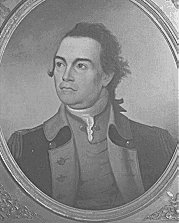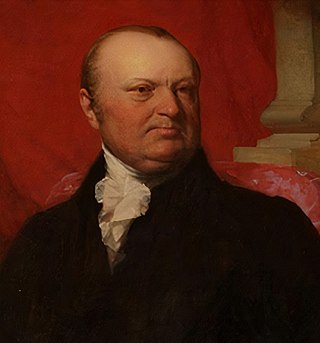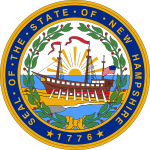
The 1792 United States presidential election was the second quadrennial presidential election. It was held from Friday, November 2, to Wednesday, December 5, 1792. Incumbent President George Washington was elected to a second term by a unanimous vote in the electoral college, while John Adams was re-elected as vice president. Washington was essentially unopposed, but Adams faced a competitive re-election against Governor George Clinton of New York.

Josiah Bartlett was an American Founding Father, physician, statesman, a delegate to the Continental Congress for New Hampshire, and a signatory to the Declaration of Independence and Articles of Confederation. He served as the first governor of New Hampshire and chief justice of the New Hampshire Superior Court of Judicature.

The 1792–93 United States House of Representatives elections were held on various dates in various states between August 27, 1792, and September 6, 1793. Each state set its own date for its elections to the House of Representatives before the first session of the 3rd United States Congress convened on December 2, 1793. With the addition of the new state of Kentucky's representatives, and the congressional reapportionment based on the 1790 United States census, the size of the House increased to 105 seats.

Josiah Bartlett Jr. was an American physician and politician from New Hampshire. He served as a United States Representative from New Hampshire and as a member of the New Hampshire Senate during the early 1800s.

The 1792–93 United States Senate elections were held on various dates in various states, coinciding with President George Washington's unanimous re-election. As these U.S. Senate elections were prior to the ratification of the Seventeenth Amendment in 1913, senators were chosen by state legislatures. Senators were elected over a wide range of time throughout 1792 and 1793, and a seat may have been filled months late or remained vacant due to legislative deadlock. In these elections, terms were up for the ten senators in Class 2.

The 1793 United States House of Representatives elections in New York were held in January 1793, to elect 10 U.S. Representatives to represent the State of New York in the United States House of Representatives.

The 1792 United States elections elected the members of the 3rd United States Congress. Congress was broadly divided between a Pro-Administration faction supporting the policies of George Washington's administration and an Anti-Administration faction opposed to those policies. Due to this, the Federalist Party and the Democratic-Republican Party were starting to emerge as the distinct political parties of the First Party System. In this election, the Pro-Administration faction maintained control of the Senate, but lost its majority in the House.
Elections to the Massachusetts Senate were held during 1788 to elect 40 State Senators. Candidates were elected at the county level, with some counties electing multiple Senators.

The 1823 New Hampshire gubernatorial election was held on March 11, 1823.

The 1817 New Hampshire gubernatorial election was held on March 11, 1817.

The 1785 New Hampshire gubernatorial election was held on 8 March 1785 in order to elect the President of New Hampshire. Candidates consisted of John Langdon, George Atkinson, John Sullivan and Josiah Bartlett. Since no candidate received a majority in the popular vote, Langdon was elected by the New Hampshire General Court per the state constitution, despite having come in second in the popular vote.

The 1786 New Hampshire gubernatorial election was held on 14 March 1786 in order to elect the President of New Hampshire. Incumbent Anti-Federalist President John Langdon was defeated in his re-election bid by Federalist candidate John Sullivan, who had initially finished third during the previous President election.

The 1787 New Hampshire gubernatorial election was held on 13 March 1787 in order to elect the President of New Hampshire. Incumbent Federalist President John Sullivan defeated Anti-Federalist candidate and former President John Langdon, 1785 President Anti-Federalist candidate Josiah Bartlett and Federalist judge Samuel Livermore. Since no candidate received a majority in the popular vote, Sullivan was elected by the New Hampshire General Court per the state constitution, despite having come in second in the popular vote.

The 1788 New Hampshire gubernatorial election was held on 11 March 1788 in order to elect the President of New Hampshire. Incumbent Federalist President John Sullivan was defeated in his re-election bid by Anti-Federalist candidate and former President John Langdon, who had initially finished first in the popular vote during the previous President election.

The 1789 New Hampshire gubernatorial election was held on 10 March 1789 in order to elect the President of New Hampshire. Federalist candidate and former President John Sullivan defeated incumbent Acting President John Pickering and 1785 & 1787 President Anti-Federalist candidate Josiah Bartlett. Since no candidate received a majority in the popular vote, Sullivan was elected by the New Hampshire General Court per the state constitution.

The 1790 New Hampshire gubernatorial election was held on 9 March 1790 in order to elect the President of New Hampshire. Third time Anti-Federalist candidate Josiah Bartlett defeated former Acting President John Pickering, Joshua Wentworth and former delegate to the Continental Congress Nathaniel Peabody. Since no candidate received a majority in the popular vote, Bartlett was elected by the New Hampshire General Court per the state constitution, despite placing third in the popular vote.

The 1791 New Hampshire gubernatorial election was held on 8 March 1791 in order to elect the President of New Hampshire. Incumbent Anti-Federalist President Josiah Bartlett was re-elected unopposed.

The 1793 New Hampshire gubernatorial election was held on 12 March 1793 in order to elect the Governor of New Hampshire. Incumbent Anti-Federalist Governor Josiah Bartlett defeated former Anti-Federalist Governor John Langdon, Federalist candidate John Taylor Gilman and Anti-Federalist candidate Timothy Walker.

The 1795 New Hampshire gubernatorial election was held on 10 March 1795 in order to elect the Governor of New Hampshire. Incumbent Federalist Governor John Taylor Gilman was re-elected unopposed.

The 1796 New Hampshire gubernatorial election was held on 8 March 1796 in order to elect the Governor of New Hampshire. Incumbent Federalist Governor John Taylor Gilman was re-elected unopposed.













